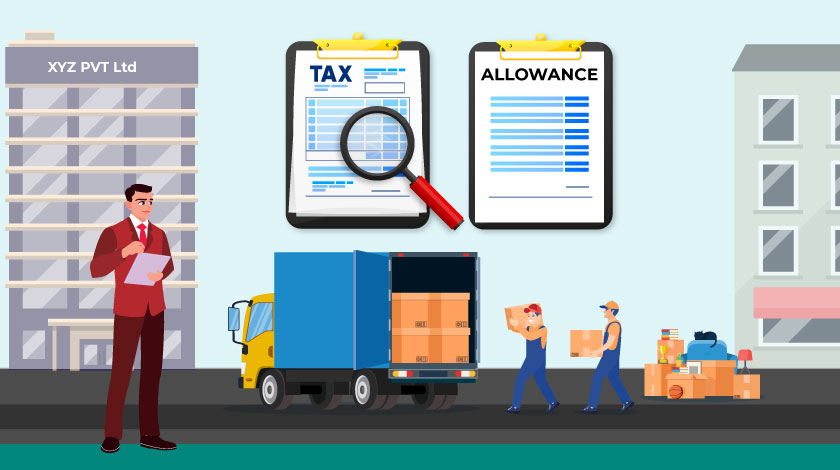All You Need to Know About Relocation Allowance in India

A relocation allowance meaning, a financial assistance provided by employers to cover the expenses incurred during an employee's move to a new location for work purposes. This assistance aims to ease the financial burden of the relocation process, encompassing a range of costs from moving personal belongings to travel and temporary accommodation.
It's not just about the immediate financial aid but also about the long-term implications, particularly concerning income tax and tax exemptions. A well-informed employee can effectively plan and utilize the allowance, ensuring a smoother transition both financially and personally.
This blog aims to provide an in-depth look into everything you need to know about relocation allowances in India, from what constitutes this allowance to its impact on your taxes, thus empowering you to make informed decisions during your career journey.
What is Relocation Allowance?
A relocation allowance is a financial benefit provided by an employer to an employee to cover the expenses incurred in the process of moving and resettling in a new location for work purposes. The primary purpose of this allowance is to acknowledge and support the employee's willingness to relocate, often involving significant changes in their personal and professional lives.
Expenses Covered Under Relocation Allowance in India

- Packing and Moving Costs: This is often the most significant expense in any relocation process. Relocation allowances usually cover the costs of hiring professional movers and packers to safely transport the employee's personal belongings from the old residence to the new one. This can include the costs of packing materials, handling charges, and the physical transportation of items.
- Temporary Accommodation: Upon arriving at the new location, employees might need temporary housing before they find a permanent residence. Relocation allowances often cover the costs of short-term rentals or hotel stays during this transitional period.
- Travel Expenses: This encompasses the cost of travel from the old location to the new one. It can include airfare, train tickets, or fuel costs if the employee is traveling by their own vehicle. Some companies also cover the cost of meals and other incidental expenses during the journey.
- Miscellaneous Expenses: Depending on company policy, the relocation allowance might also cover additional costs such as storage fees for belongings, expenses related to finding new housing (like real estate agent fees), and sometimes even the costs associated with settling into the new location, like school fees for children or language classes in case of an international move.
Understanding your relocation allowance is just one part of the moving puzzle. We know there are countless other tasks vying for your attention during this transition. Why not focus on settling into your new life and let us handle the heavy lifting?
Company Policies on Relocation Allowance in India

When it comes to relocation allowances, company policies can vary significantly, shaped by factors like company size, nature of the business, employee roles, and the relocation's geographical scope. Understanding how companies determine and administer these allowances is essential for employees to navigate their relocation process effectively.
Determining Relocation Allowance
- Assessment of Relocation Needs: Companies often start by assessing the specific needs of the relocation. This could be based on the distance of the move, the cost of living in the new location, and the family situation of the employee.
- Standardized vs. Customized Packages: Some companies offer standardized relocation packages that apply uniformly to all employees, while others opt for customized packages tailored to individual circumstances.
Common Policies and Conditions
- Eligibility Criteria: Policies usually specify which employees are eligible for relocation allowances, often based on factors like tenure, position, and the nature of the job transfer.
- Approval Process: The procedure to obtain approval for a relocation allowance typically involves multiple levels of management and HR, ensuring that the allowance is justified and within policy limits.
Employee Eligibility and Process for Relocation Allowance

Navigating the eligibility criteria and process for claiming a relocation allowance is a critical step for employees undergoing a job-related move. Understanding these aspects ensures a smooth transition and proper utilization of the benefits offered.
Criteria for Employee Eligibility
- Job Role and Level: Often, eligibility is determined by the employee's position within the company. Higher-level employees or those in critical roles might be more likely to receive relocation benefits.
- Nature of Relocation: Eligibility can also depend on the reason for relocation, such as a transfer, promotion, or accepting a new position within the company.
- Tenure: Some companies require employees to have worked for a certain period before being eligible for relocation assistance.
- Distance of Move: There might be a minimum distance requirement for relocation to be considered eligible for the allowance.
The Process of Claiming Relocation Allowance
- Initiating the Process: The process usually starts with the employee receiving a relocation offer, which should be carefully reviewed for terms and conditions.
- Submission of a Request: Employees typically need to submit a formal request or application for the relocation allowance, outlining the expected expenses and other relevant details.
- Approval from Management: The request is then reviewed by the appropriate management or HR personnel, who will approve or deny the claim based on company policy and budget considerations.
Required Documentation and Approval Process
- Documentation of Expenses: Employees are generally required to provide detailed documentation of their relocation expenses. This includes receipts, invoices, and estimates for services like moving, travel, and temporary lodging.
- Verification and Compliance: The submitted documents are reviewed to ensure they comply with company policy and the terms of the relocation allowance.
- Reimbursement or Direct Payment: Depending on the company's policy, the allowance may be provided as a reimbursement after submission of expenses or as a direct payment to service providers.
- Tax Documentation: In some cases, employees might also need to provide tax-related documents, especially if part of the allowance is tax-exempt.
Income Tax Implications on Relocation Allowance

Understanding the tax implications of a relocation allowance is crucial for employees in India, as it affects the net benefit received from such allowances. The Indian Income Tax Act provides specific guidelines on how relocation allowances are treated for tax purposes.
Overview of Taxability of Relocation Allowance
- Taxable as Income: In general, relocation allowances are considered taxable income under the Indian Income Tax Act. This means that the allowance, or a portion of it, is subject to tax, similar to an employee’s regular salary.
- Dependent on Actual Expenses: However, the taxability of the allowance often depends on the actual expenses incurred during the relocation. If the employee can provide proof of expenses, parts of the allowance may be exempt from tax.
- Varying Tax Rates: The tax rate applied to the relocation allowance depends on the employee's overall income slab. Therefore, the impact on an individual’s tax liability will vary based on their total annual income.
Tax Exemptions under Indian Income Tax Laws
- Exemption for Specific Components: Certain components of the relocation allowance, like expenses for transporting personal effects and travel costs for the employee and their family, can qualify for tax exemptions.
- Submission of Bills and Receipts: To claim these exemptions, employees must submit relevant bills and receipts to their employer. The employer will then exclude these amounts from the taxable portion of the allowance.
- Limits on Exemption Amounts: There may be limits or conditions on the exemption amounts as prescribed by tax laws or company policy.
Calculation Examples for Better Understanding
- Example 1: Suppose an employee receives a relocation allowance of ₹1,00,000, and their total relocation expenses (with valid bills) amount to ₹80,000. In this case, ₹80,000 can be claimed as exempt, and the remaining ₹20,000 will be taxable.
- Example 2: If an employee in the 30% tax bracket receives a taxable relocation allowance of ₹50,000 (after exemptions), the tax liability on this allowance would be ₹15,000 (30% of ₹50,000).
Navigating Your Relocation Allowance Journey: Key Takeaways and Expert Advice
Relocating for work is a significant event that comes with its set of challenges and opportunities. Through this comprehensive guide, we've explored the various facets of relocation allowances in India, offering insights to help you navigate this transition effectively.
As you embark on your relocation journey, it is crucial to remember that each situation is unique. The policies of different companies, the specifics of individual relocation circumstances, and the ever-evolving tax regulations make it imperative to seek personalized guidance.
Relocating is not just about moving to a new place; it's about transitioning to a new phase in your professional life. With the right information and guidance of professional office relocation service, this journey can be managed smoothly, allowing you to focus on the exciting opportunities that lie ahead in your career.











